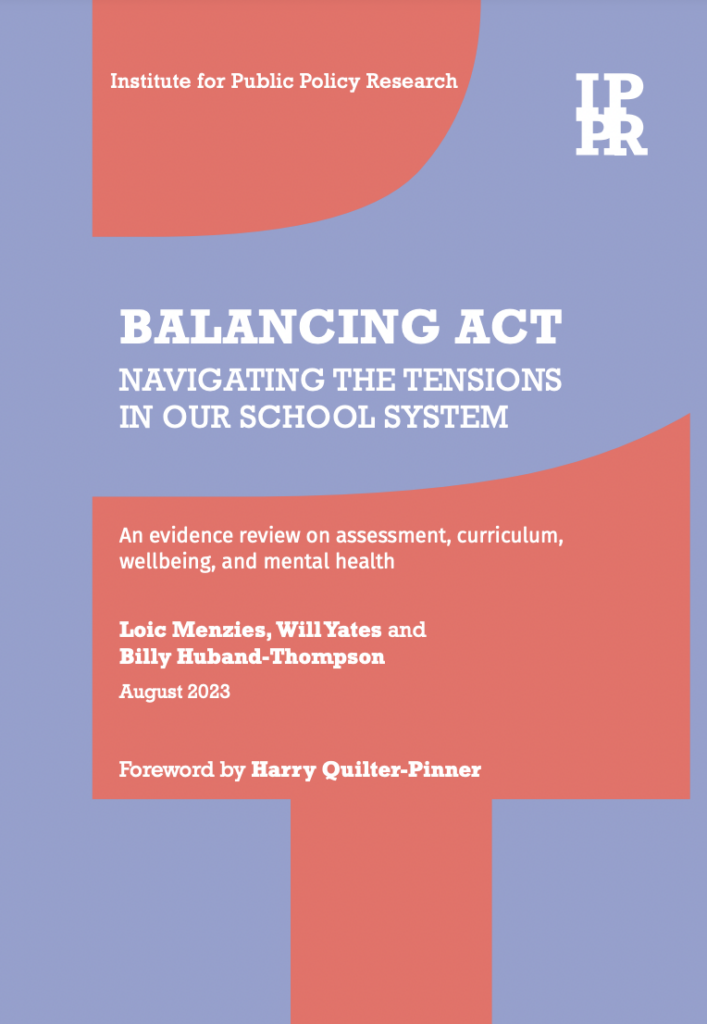We are delighted that research supported by Big Change has today been published by our partner IPPR and researchers from CfEY.
This research was undertaken to build on our work to date to set a new direction for education and learning. So far we have focused on listening to and understanding the problems and big changes that the public (young people, teachers, parents and employers) want to see in education, which we published in 2022. This report explores academic research in the three areas of the school system that people believe need to change: wellbeing, curriculum and assessment.
This report will be used to inform future work between Big Change and IPPR, including a publication seeking to shape the manifestos of political parties ahead of the next election and ongoing Big Education Conversations with young people, parents, teachers and employers.
Read the Foreword to the report below, read the Schools Week article and download it in full at the IPPR website.
Balancing act: Navigating the tensions in our school system
Since 2020, Big Change and IPPR have been working together and with many other partners to set a new direction for education and learning in England. This work has focussed on understanding and elevating the public appetite for long term, significant changes. It included a large-scale and in-depth national listening exercise across 2020 and 2021 to capture the views of the public (young people, parents, educators, employers) and assess the post-pandemic demand for change.
This started with research (Quilter-Pinner and Ambrose 2020) arguing for new public conversations about the future of education, and included social listening (Winthrop et al 2021), a listening post study (Relationships Foundation and Big Change 2021), digital marketing and polling to get to grips with large-scale public opinion, alongside focus groups and interviews with teachers, school leaders, parents and employers. As part of this listening exercise, Big Change delivered the Big Education Conversation campaign in June to July 2021, which involved over 25,000 people and 40 partner organisations discussing the purpose of education and sharing ideas for change.
Our polling shows that:
- 77 per cent of young people, parents, teachers and employers agree that we need to rethink the purpose of education and change the system for the better (2021 polling)
- 75 per cent of people believe our country needs a bold, long-term vision for education that all parts of society have contributed to (2022 polling)
- 71 per cent think the government failed to seize the opportunity to transform education post-pandemic, but change is still needed (2022 polling).
This was brought together in Subject to Change (Goddard et al 2022) which captures the findings of all that work. We identify three key messages to shape a new direction for education and learning.
1. It’s time to rethink what education is for: We must focus not just on how education is delivered, but what it is trying to achieve, for individuals and society.
2. One size doesn’t really fit anyone: The majority feel the system isn’t working for them – even those who are labelled ‘successful’ by current measures.
3. It really does take a village: Young people, parents and employers want to work with and beyond schools to help young people learn and thrive.
Our work to date has focussed on understanding and galvanising public opinion about the change that education and learning needs. This is vitally important evidence that must be listened to, and the Big Education Conversation initiative is continuing across England. But it is not the only form of evidence that should shape our response. This paper builds on this programme of work by seeking to identify what academic evidence has to say about the changes that are needed in education and learning.
In particular, we have sought to tackle three of the most challenging questions that emerge from our listening and engagement with young people, parents, teachers and employers. These are as follows:
1. How can school systems fairly and effectively assess young people’s learning, recognise achievement beyond exams, and drive better school standards?
2. What are the likely impacts and potential trade-offs involved in broadening the curriculum beyond just academic subjects for young people?
3. What are the most effective ways school systems can support and improve young people’s wellbeing?
We want to understand what the existing evidence says about these questions, as well as where there are evidence gaps that need filling, making a distinction between evidence that something doesn’t work and the absence of evidence. This paper will be used to inform future work between IPPR and Big Change, including a publication seeking to shape the manifestos of political parties ahead of the next election and ongoing Big Education Conversations with young people, parents, teachers and employers.
TERMS OF REFERENCE
We focus on key stages 1 to 4, while touching more briefly on key stage 5, since the IPPR is conducting separate work focussing more specifically on the early years and post-16 education. We focus specifically on England rather than the devolved nations, in which education policy has taken differing paths. When reviewing the evidence on assessment, we recognise that teachers routinely assess pupils’ learning to inform their teaching, but our focus is on national assessments that are part of statutory frameworks (such as SATs, GCSEs and BTECs).

